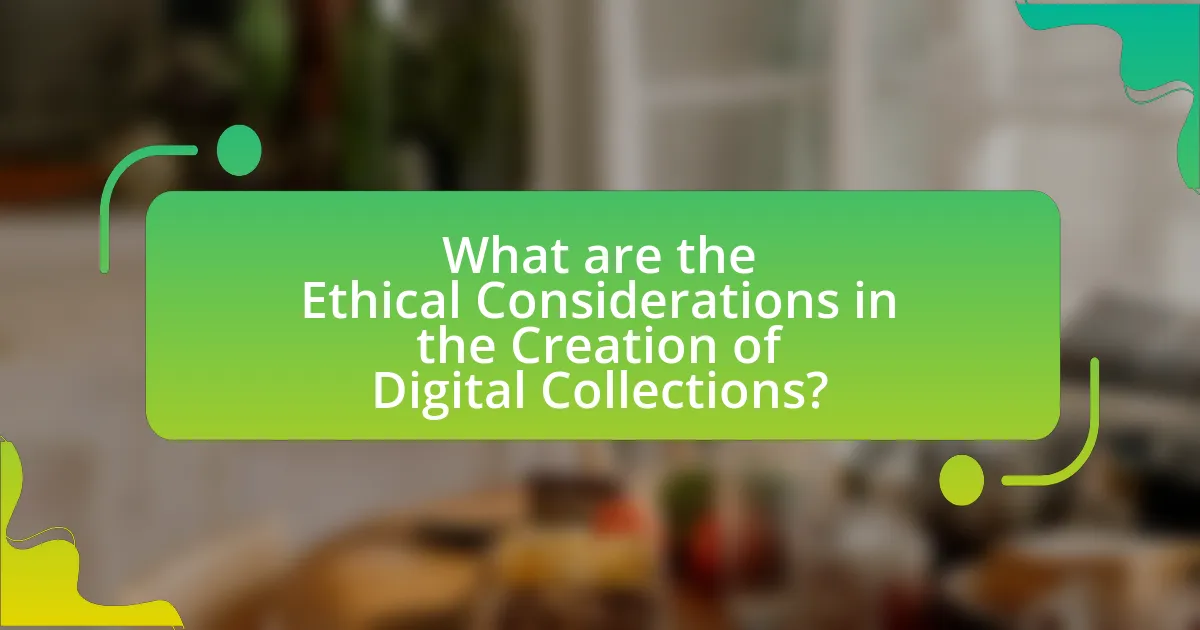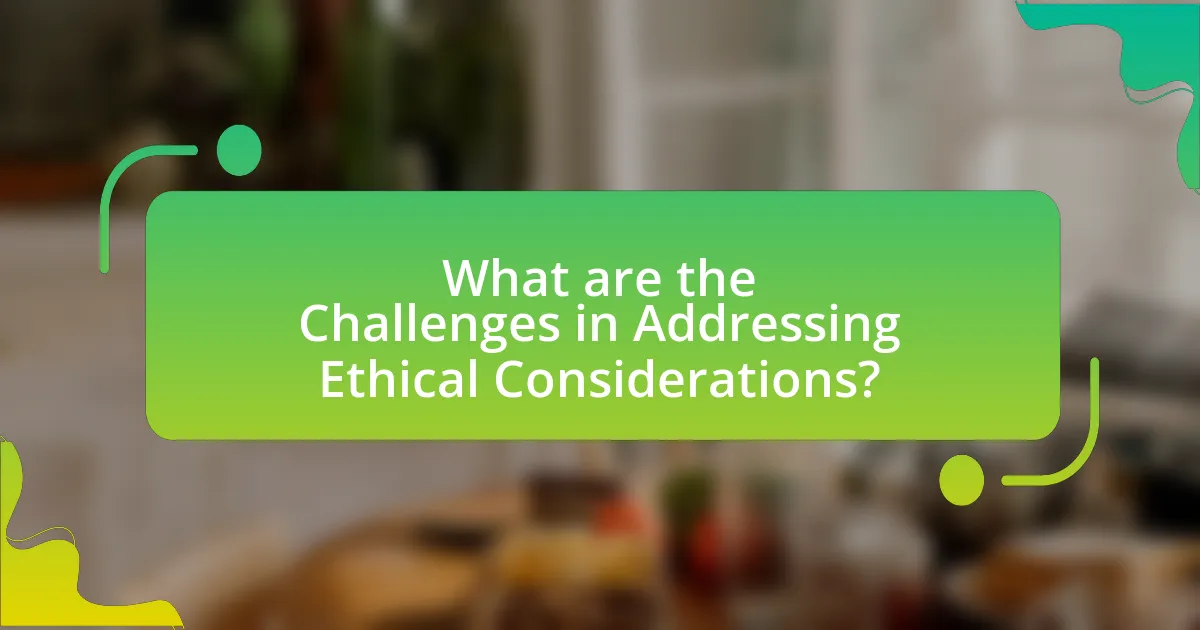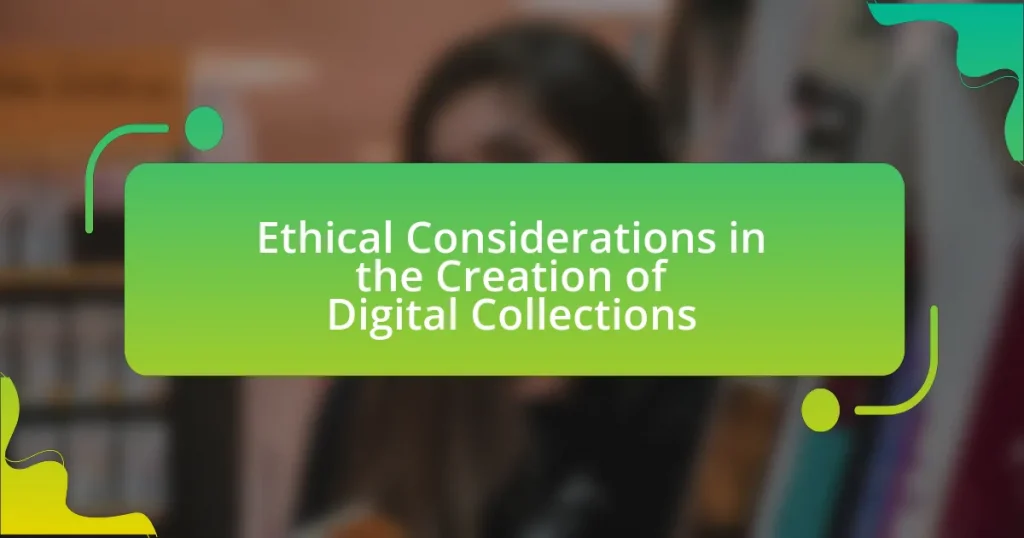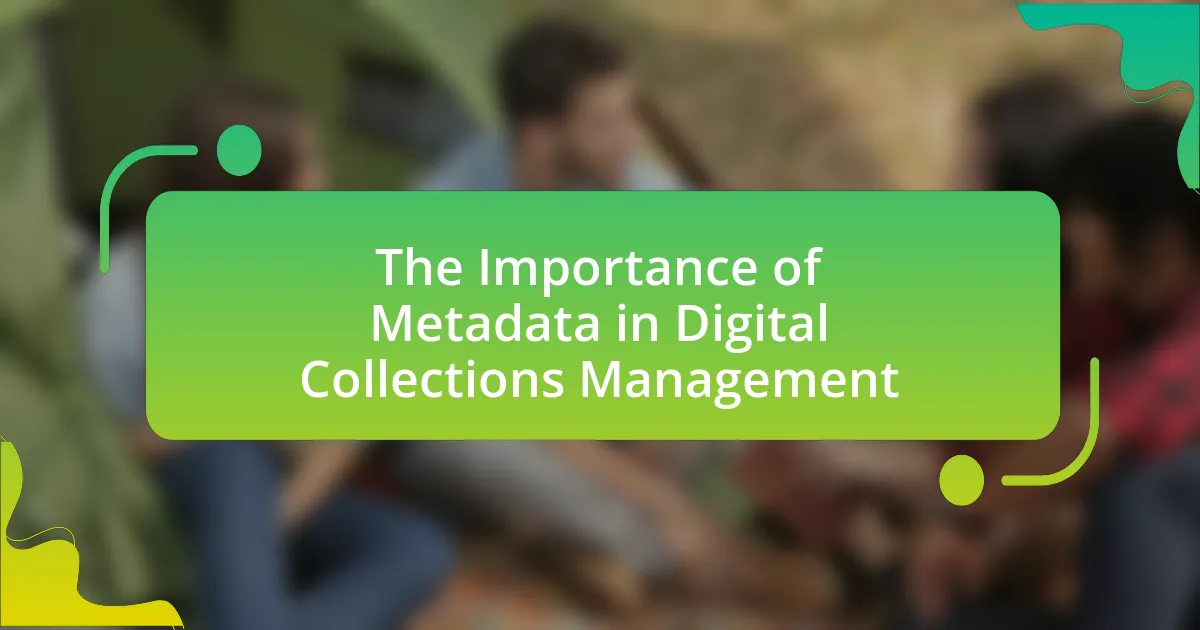The article focuses on the ethical considerations involved in the creation of digital collections, emphasizing key issues such as copyright, privacy, representation, and accessibility. It outlines the importance of ethical practices in ensuring responsible information use, protecting individual rights, and fostering trust among users. Common ethical dilemmas, including copyright infringement and misrepresentation of marginalized groups, are discussed alongside the impact of legal frameworks on ethical decision-making. The article also highlights best practices for ethical digital collection creation, including obtaining informed consent, promoting equitable access, and engaging with communities to enhance cultural sensitivity.

What are the Ethical Considerations in the Creation of Digital Collections?
The ethical considerations in the creation of digital collections include issues of copyright, privacy, representation, and accessibility. Copyright laws dictate how materials can be used and shared, requiring creators to ensure they have the right to digitize and distribute content. Privacy concerns arise when personal data or sensitive information is included in collections, necessitating measures to protect individuals’ identities. Representation is critical, as digital collections should accurately reflect diverse perspectives and avoid perpetuating biases. Accessibility ensures that collections are usable by individuals with disabilities, aligning with legal standards such as the Americans with Disabilities Act. These considerations are essential for fostering trust and integrity in digital archiving practices.
Why is ethics important in digital collection creation?
Ethics is important in digital collection creation because it ensures the responsible use of information and respect for the rights of individuals and communities. Ethical practices guide the selection, representation, and accessibility of digital materials, preventing harm and promoting fairness. For instance, adhering to copyright laws and obtaining necessary permissions protects creators’ rights and fosters trust. Additionally, ethical considerations help avoid biases in representation, ensuring diverse voices are included and accurately portrayed, which is crucial for cultural sensitivity and inclusivity.
What ethical dilemmas commonly arise in this process?
Ethical dilemmas that commonly arise in the creation of digital collections include issues of copyright infringement, privacy concerns, and the representation of marginalized groups. Copyright infringement occurs when digital collections include materials without proper permissions, potentially violating intellectual property laws. Privacy concerns arise when personal data or sensitive information is digitized without consent, leading to potential misuse or exposure. Additionally, the representation of marginalized groups can lead to ethical issues if their perspectives are misrepresented or if their contributions are not adequately acknowledged, which can perpetuate historical injustices. These dilemmas highlight the need for careful consideration and adherence to ethical standards in the digitization process.
How do ethical considerations impact user trust?
Ethical considerations significantly impact user trust by establishing a framework of transparency, accountability, and respect for user privacy. When organizations prioritize ethical practices, such as obtaining informed consent and ensuring data security, users are more likely to feel secure and valued, which fosters trust. For instance, a study by the Pew Research Center found that 79% of Americans are concerned about how their data is used, indicating that ethical handling of data can directly influence user perceptions and trust levels. Therefore, ethical considerations are crucial in building and maintaining user trust in digital collections.
What principles guide ethical practices in digital collections?
Ethical practices in digital collections are guided by principles such as respect for intellectual property, user privacy, and equitable access. Respect for intellectual property ensures that creators’ rights are upheld, preventing unauthorized use of their work. User privacy is paramount, as it protects individuals’ personal information and maintains trust in digital platforms. Equitable access promotes inclusivity, ensuring that diverse populations can benefit from digital resources. These principles are supported by frameworks like the American Library Association’s Code of Ethics, which emphasizes the importance of these values in the stewardship of digital collections.
How do privacy and consent play a role in ethical digital collections?
Privacy and consent are fundamental to ethical digital collections as they ensure that individuals’ personal information is protected and that their rights are respected. Ethical digital collections require explicit consent from individuals before their data is collected, used, or shared, aligning with legal frameworks such as the General Data Protection Regulation (GDPR), which mandates that organizations obtain informed consent for data processing. Furthermore, maintaining privacy safeguards against unauthorized access and misuse of sensitive information, thereby fostering trust between data collectors and the public. This adherence to privacy and consent not only complies with legal standards but also promotes ethical practices in the management of digital collections.
What is the significance of cultural sensitivity in digital archiving?
Cultural sensitivity in digital archiving is significant because it ensures that diverse cultural perspectives are respected and accurately represented in digital collections. This sensitivity helps prevent the misrepresentation or appropriation of cultural artifacts, which can lead to ethical violations and harm to the communities from which these artifacts originate. For instance, the American Library Association emphasizes that culturally sensitive practices in archiving foster trust and collaboration between archivists and communities, thereby enhancing the authenticity and relevance of the archived materials. By prioritizing cultural sensitivity, digital archivists can create inclusive collections that honor the histories and narratives of various cultural groups, ultimately contributing to a more equitable representation in the digital landscape.
How do legal frameworks influence ethical considerations?
Legal frameworks significantly influence ethical considerations by establishing the boundaries within which individuals and organizations operate. These frameworks, such as copyright laws and data protection regulations, dictate what is permissible in the creation and management of digital collections. For instance, the General Data Protection Regulation (GDPR) in the European Union mandates that personal data must be processed lawfully, transparently, and for specific purposes, thereby shaping ethical practices related to user consent and data usage. Additionally, copyright laws protect intellectual property, which influences ethical considerations regarding the reproduction and distribution of digital content. By defining legal obligations, these frameworks compel creators and curators to align their ethical practices with legal standards, ensuring accountability and respect for rights holders.
What laws govern the use of digital collections?
The laws governing the use of digital collections primarily include copyright law, privacy law, and data protection regulations. Copyright law protects the rights of creators and owners of digital content, ensuring that their works are not used without permission. For instance, the U.S. Copyright Act of 1976 provides the framework for copyright protection in the United States, while the Berne Convention establishes international copyright standards. Privacy laws, such as the General Data Protection Regulation (GDPR) in the European Union, regulate how personal data within digital collections can be collected, stored, and shared. Additionally, data protection regulations mandate that organizations must obtain consent from individuals before using their personal information in digital collections. These laws collectively ensure that the creation and use of digital collections respect intellectual property rights and individual privacy.
How do copyright issues affect ethical practices in digital collections?
Copyright issues significantly impact ethical practices in digital collections by dictating the permissible use of copyrighted materials. When digital collections include copyrighted works without proper authorization, they violate the rights of creators and can lead to legal repercussions. For instance, the U.S. Copyright Act of 1976 establishes the rights of authors and creators, emphasizing the need for permission or licensing for reproduction and distribution. This legal framework necessitates that institutions curating digital collections adhere to ethical standards by ensuring that they have the right to use the materials they include, thereby respecting intellectual property rights and promoting fair use principles. Failure to comply with copyright laws not only undermines the integrity of the collection but also jeopardizes the institution’s reputation and trustworthiness in the academic and public spheres.

What are the Challenges in Addressing Ethical Considerations?
The challenges in addressing ethical considerations in the creation of digital collections include balancing the rights of individuals with the need for public access to information. Ethical dilemmas arise when determining how to handle sensitive data, ensuring informed consent, and respecting cultural heritage. For instance, the use of personal data without consent can lead to privacy violations, while the digitization of culturally significant materials may raise issues of ownership and representation. These challenges are compounded by the rapid pace of technological advancement, which often outstrips existing ethical guidelines and legal frameworks, making it difficult to establish clear protocols.
What obstacles do creators face in implementing ethical practices?
Creators face several obstacles in implementing ethical practices, primarily including lack of awareness, resource constraints, and conflicting interests. Many creators may not fully understand ethical guidelines or the implications of their work, leading to unintentional ethical breaches. Additionally, limited financial and human resources can hinder the ability to conduct thorough ethical reviews or implement necessary changes. Conflicting interests, such as commercial pressures versus ethical responsibilities, further complicate the decision-making process. These challenges are documented in studies, such as the “Ethics in Digital Collections” report by the American Library Association, which highlights the need for better training and support for creators to navigate ethical dilemmas effectively.
How do resource limitations affect ethical decision-making?
Resource limitations significantly impact ethical decision-making by constraining the options available to decision-makers, often leading to compromises in ethical standards. When resources such as time, funding, or personnel are limited, individuals and organizations may prioritize efficiency or cost-effectiveness over ethical considerations, resulting in decisions that could harm stakeholders or violate ethical norms. For instance, a study by the American Psychological Association found that organizations facing budget cuts often experience a decline in ethical behavior, as employees may feel pressured to meet targets at the expense of ethical practices. This correlation illustrates that resource constraints can lead to a diminished commitment to ethical principles in decision-making processes.
What role does institutional policy play in ethical challenges?
Institutional policy serves as a framework that guides decision-making and behavior in addressing ethical challenges. These policies establish standards for ethical conduct, ensuring that actions align with legal and moral expectations. For instance, in the context of digital collections, institutional policies can dictate how data is collected, stored, and shared, thereby influencing the ethical considerations surrounding privacy, consent, and intellectual property. By providing clear guidelines, institutional policies help mitigate risks associated with ethical dilemmas, such as the misuse of sensitive information or the potential for bias in digital representation.
How can biases impact the ethical creation of digital collections?
Biases can significantly impact the ethical creation of digital collections by leading to the exclusion or misrepresentation of certain groups or perspectives. When curators and creators allow personal or systemic biases to influence their selection and organization of digital materials, they risk perpetuating stereotypes and reinforcing existing inequalities. For instance, a study by the American Library Association found that digital collections often underrepresent marginalized communities, which can result in a skewed historical narrative that fails to acknowledge diverse experiences. This lack of representation not only affects the integrity of the collection but also undermines the ethical responsibility of creators to provide an inclusive and accurate portrayal of history and culture.
What types of biases are most prevalent in digital collections?
The most prevalent types of biases in digital collections include selection bias, representation bias, and confirmation bias. Selection bias occurs when certain items are favored over others during the curation process, leading to an incomplete or skewed collection. Representation bias arises when the digital collection does not accurately reflect the diversity of the source material, often marginalizing underrepresented groups. Confirmation bias manifests when curators prioritize materials that support existing narratives or beliefs, ignoring contradictory evidence. These biases can significantly impact the accessibility and interpretation of digital collections, as evidenced by studies showing that collections often underrepresent minority voices and perspectives, thereby perpetuating historical inequalities.
How can creators mitigate bias in their collections?
Creators can mitigate bias in their collections by employing diverse perspectives during the curation process. This involves actively seeking contributions from underrepresented groups and incorporating a variety of viewpoints to ensure a more balanced representation. Research indicates that diverse teams are more effective at identifying and addressing biases, as they bring different experiences and insights to the table. For instance, a study by the McKinsey Global Institute found that organizations with diverse workforces are 35% more likely to outperform their peers in terms of financial returns, highlighting the importance of inclusivity in decision-making processes. By prioritizing diversity and inclusivity, creators can significantly reduce bias in their collections.

What Best Practices Can Be Adopted for Ethical Digital Collections?
Best practices for ethical digital collections include obtaining informed consent from content creators and subjects, ensuring equitable access to materials, and maintaining transparency about the collection’s purpose and use. Informed consent is crucial as it respects the rights of individuals whose work or likeness is included, fostering trust and accountability. Equitable access ensures that diverse communities can engage with the collections, promoting inclusivity and representation. Transparency about the collection’s intent and usage helps to mitigate potential misuse and reinforces ethical stewardship. These practices align with guidelines from organizations such as the American Library Association and the International Council on Archives, which emphasize ethical responsibilities in digital archiving.
What strategies can enhance ethical practices in digital collection creation?
Implementing clear consent protocols enhances ethical practices in digital collection creation. Establishing informed consent ensures that individuals understand how their data will be used, which aligns with ethical standards in data collection. Additionally, employing transparency in data usage and providing options for individuals to opt-out can further reinforce ethical practices. Research indicates that organizations that prioritize ethical guidelines in data collection not only comply with legal standards but also build trust with their users, leading to more robust and responsible digital collections.
How can transparency improve ethical standards?
Transparency can improve ethical standards by fostering accountability and trust among stakeholders. When organizations openly share their processes, decisions, and data, they create an environment where ethical practices are more likely to be upheld. For instance, a study by the Transparency International found that organizations with transparent operations are less likely to engage in corrupt practices, as the risk of exposure acts as a deterrent. Furthermore, transparency allows for greater scrutiny from external parties, which can lead to improved compliance with ethical guidelines and standards.
What role does community engagement play in ethical practices?
Community engagement is crucial in ethical practices as it fosters transparency, accountability, and inclusivity in decision-making processes. Engaging with the community allows organizations to understand diverse perspectives and needs, ensuring that ethical considerations reflect the values and concerns of those affected. For instance, research by the American Library Association highlights that involving community members in the development of digital collections leads to more culturally sensitive and relevant content, thereby enhancing ethical standards in representation and access. This collaborative approach not only builds trust but also aligns organizational practices with the ethical imperative of serving the community effectively.
What tools and resources are available for ethical digital collection practices?
Ethical digital collection practices can be supported by various tools and resources, including guidelines from the Digital Library Federation (DLF), the International Council on Archives (ICA), and the American Library Association (ALA). These organizations provide frameworks and best practices that emphasize consent, privacy, and cultural sensitivity in digital collections. For instance, the DLF’s “Principles of Open Scholarly Infrastructure” outlines ethical considerations for digital scholarship, while the ICA’s “Code of Ethics” offers guidance on respecting the rights of individuals and communities in archival practices. Additionally, software tools like Omeka and ArchivesSpace facilitate ethical management of digital collections by allowing for proper metadata creation and user access controls, ensuring that ethical standards are upheld throughout the collection process.
How can guidelines and frameworks assist creators in ethical decision-making?
Guidelines and frameworks assist creators in ethical decision-making by providing structured principles and standards that inform their choices. These tools help creators navigate complex ethical dilemmas by outlining best practices, ensuring compliance with legal and moral obligations, and promoting accountability. For instance, the Association of College and Research Libraries (ACRL) offers a framework that emphasizes the importance of ethical stewardship in digital collections, guiding creators to consider the implications of their work on diverse communities. This structured approach not only enhances the integrity of the creation process but also fosters trust among stakeholders, as evidenced by studies showing that adherence to ethical guidelines leads to more responsible and inclusive practices in digital content creation.
What training opportunities exist for understanding ethics in digital collections?
Training opportunities for understanding ethics in digital collections include workshops, online courses, and certification programs offered by various institutions. For instance, the Digital Library Federation provides resources and training sessions focused on ethical practices in digital curation. Additionally, organizations like the Society of American Archivists offer webinars and courses that address ethical considerations in managing digital collections. These training programs often cover topics such as copyright, privacy, and the ethical implications of digitization, ensuring that participants are well-informed about the complexities involved in digital collection management.
What are the key takeaways for ethical digital collection creation?
Key takeaways for ethical digital collection creation include obtaining informed consent from contributors, ensuring equitable access to materials, and respecting copyright and intellectual property rights. Informed consent is crucial as it empowers individuals to understand how their contributions will be used, fostering trust and transparency. Equitable access ensures that diverse communities can benefit from the collections, promoting inclusivity and representation. Additionally, adhering to copyright laws protects the rights of creators and maintains the integrity of the collection. These principles are supported by guidelines from organizations such as the American Library Association, which emphasizes the importance of ethical practices in digital curation.






